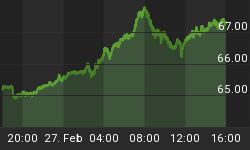It never ceases to amaze how televised media reports on the U.S. economy are almost exclusively about shopping. Such reports almost always feature images of sales clerks frantically stocking shelves and long lines of consumers swiping their credit cards. In contrast, reports about the economy of Japan or China typically include footage of smoke stacks billowing, production lines moving, robots assembling, and people actually making things. Doesn't it ever occur to anyone producing these segments just how ridiculous this is?
Despite the implications that Americans and Asians are simply relying on different types of fuel to fire their respective economic engines, production and consumption are by no means interchangeable. Production is the means, consumption is the end. A society can no more consume its way to prosperity than an individual can. However, just as an individual can consume himself into bankruptcy, so too can a nation.
Americans are not producing wealth, but merely consuming the wealth produced by others. When Americans go shopping this Christmas season (primarily spending borrowed money on imported goods), classic economic theory holds that the principal benefit goes not to the U.S. but to those who supply the goods. In exchange for their production, they receive interest and dividend paying assets (dollars, bonds, stocks, etc), which should provide future wealth. Americans in return accumulate depreciating consumer goods and piles of external liabilities that must be serviced and repaid. So Americans squander the wealth of their parents while their vendors amass it for their children.
However, the classic economic theory may not actually be in play as the liabilities our "trading" partners are now accumulating will likely be repaid in currency with severely diminished purchasing power. Trade normally involves the exchange of real stuff for real stuff. As illustrated by our yawning trade deficits, we now have a system where real stuff is simply exchanged for currency, which in effect represent IOU's for future stuff. However, rather than being a source for future spending, the currency must be horded indefinitely. As the Chinese and Japanese clearly understand, any attempt to use their vast amount of dollar reserves would cause their theoretical value to collapse. Therefore they continue to accumulate more rather than to admit the extent of their prior folly.
There are many in economic circles who subscribe to the "it's our currency but it's your problem" philosophy. They maintain that China and Japan are compelled by mutually assured destruction to perpetuate the current system. However, they are only half right. There will be destruction for sure, but it will hardly be mutual. While the American economy will surely suffer, foreign economies, perhaps with a few initial hiccups, will actually prosper. Americans will soon learn that they can keep shopping only as long as foreigners continue to support the dollar. When that stops, these sanguine economists are in for a rude awakening. Think about it this way. Imagine an America where we could only consume those goods we produced domestically, and where individuals, corporations and governments could only borrow from domestic pools of savings. Then imagine the rest of the world flooded with all those extra consumer goods and savings that were formerly showered on Americans. Rather than it being "our currency their problem," it's more like "their factories, their savings, their goods," and one huge problem for us when we have to make do without them.
The sad reality is that it is foreign producers that will eventually have the last laugh. Sure we will screw them by repudiating our debts through inflation, but in the end they will enjoy all of the abundance of their productive capacity and we will suffer the wide-spread shortages that result from our lack of it. Their standards of living will soar just as ours plunge.
Don't cry over depreciating dollars. Laugh your way to prosperity instead. Protect your wealth and preserve your purchasing power before it's too late. Discover the best way to buy gold at www.goldyoucanfold.com, download my free research report on the powerful case for investing in foreign equities available at www.researchreportone.com, and subscribe to my free, on-line investment newsletter at http://www.europac.net/newsletter/newsletter.asp.















